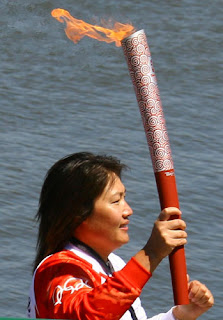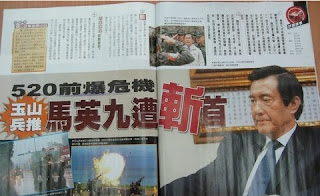 By Joan Chen (陳沖)
By Joan Chen (陳沖)
Wednesday, April 9, 2008
[The writer is an actress and director. She became a U.S. citizen in 1989]
I was born in Shanghai in 1961 and grew up during the Cultural Revolution. During my childhood, I saw my family lose our house. My grandfather, who studied medicine in England, committed suicide after he was wrongly accused of being a counterrevolutionary and a foreign spy.
Those were the worst of times.
Since the Cultural Revolution ended in the late 1970s, however, I have witnessed unimaginable progress in China. Changes that few ever thought possible have occurred in a single generation. A communist government that had no ties to the West has evolved into a more open government eager to join the international community.
A state-controlled economy has morphed into a market economy, greatly raising people's standard of living. It's clear that the majority of the Chinese people enjoy much fuller, more abundant lives today than 30 years ago. Though much remains to be done, the Chinese government has made rapid progress in opening up and trying to be part of the international community.
Last month I went to China and spent four weeks visiting Shanghai, Beijing, Hong Kong and Chengdu. The people I met and spoke with are proud and excited about the Beijing Games. They believe that the Olympics are a wonderful opportunity to showcase modern China to the rest of the world. Like many Americans, most Chinese people are disturbed by the recent events in Tibet. But after watching the scenes of violence and arson by the rioters, the Chinese believe that the government is doing the right thing in cracking down to restore order.
The Olympic torch is in California and is to be carried through San Francisco today. In a resolution criticizing China, Chris Daly, a member of the San Francisco Board of Supervisors, said that demonstrating against the torch relay would "provide the people of San Francisco with a lifetime opportunity to help 1.3 billion Chinese people gain more freedom and rights." To his credit, Mayor Gavin Newsom did not sign Daly's resolution.
This statement could not be further from reality. For one thing, the Chinese are a proud people. They want freedom and greater rights, but they know they must fight for them from within. They know that no one can grant them freedom and rights from afar. The stigma of Western imperialism and the Opium Wars also remains a strong reminder of the past, and Chinese people do not want their domestic policies to be dictated by outside powers. They also do not want the United States to boycott the opening ceremonies of the Games. The U.S. boycott of the 1980 Games in Moscow and the Soviet boycott of the 1984 Olympics in Los Angeles accomplished nothing. A U.S. boycott of the opening ceremonies in Beijing would be counterproductive for relations between the two countries.
For decades, anti-China human rights groups in Washington have spent millions of dollars denouncing China. To many Chinese, it seems that this lobby is the only voice that's acceptable or newsworthy in the U.S. media and to the U.S. government. But times are changing. We need to be open-minded and farsighted. We need to make more friends than enemies. Remember what a little ping-pong game did for Sino-U.S. relations in the 1970s? Let's celebrate the Olympics for what the Games are meant to be -- a bridge for friendship, not a playground for politics.
* The photo shows Ms Lin Li, former Olympic champion, running with the Olympic torch in San Fransisco.






